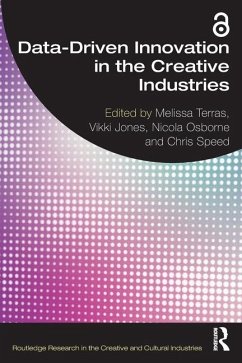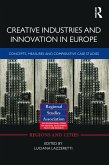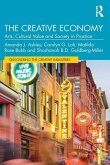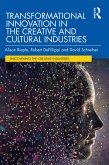The creative industries - the place where art, business, and technology meet in economic activity - have been hugely affected by the relatively recent digitalisation (and often monetisation) of work, home, relationships, and leisure. Such trends were accelerated by the global COVID-19 pandemic. This edited collection examines how the creative industries can be supported to make best use of opportunities in digital technology and data-driven innovation.
Since digital markets and platforms are now essential for revenue generation and audience engagement, there is a vital need for improved data and digital skills in the creative and cultural sectors. Taking a necessarily global perspective, this book explores the challenges and opportunities of data-driven approaches to creativity in different contexts across the arts, cultural, and heritage sectors. Chapters reach beyond the platforms and approaches provided by the technology sector to delve into the collaborative work that supports innovation around the interdisciplinary and cross-sectoral issues that emerge where data infrastructures and approaches meet creativity.
A novel intervention that uniquely centres the role of data in the theory and practice of creative industries' innovation, this book is valuable reading for those researching and studying the creative economy as well for those who drive investment for the creative industries in a digitalised society.
The Open Access version of this book, available at www.taylorfrancis.com, has been made available under a Creative Commons Attribution-Non Commercial-No Derivatives (CC-BY-NC-ND) 4.0 International license.
Since digital markets and platforms are now essential for revenue generation and audience engagement, there is a vital need for improved data and digital skills in the creative and cultural sectors. Taking a necessarily global perspective, this book explores the challenges and opportunities of data-driven approaches to creativity in different contexts across the arts, cultural, and heritage sectors. Chapters reach beyond the platforms and approaches provided by the technology sector to delve into the collaborative work that supports innovation around the interdisciplinary and cross-sectoral issues that emerge where data infrastructures and approaches meet creativity.
A novel intervention that uniquely centres the role of data in the theory and practice of creative industries' innovation, this book is valuable reading for those researching and studying the creative economy as well for those who drive investment for the creative industries in a digitalised society.
The Open Access version of this book, available at www.taylorfrancis.com, has been made available under a Creative Commons Attribution-Non Commercial-No Derivatives (CC-BY-NC-ND) 4.0 International license.
"This book captures the essence of data-led creativity - delving into the policy challenges and ethical considerations which affect this major growth sector. With some amazing real-world examples, this book constitutes a must-read for anyone wishing to learn about shaping the future of creative economies." Dr Frank Moeschler, MBE
"The Creative Industries were first defined 25 years ago, and this collection of essays is a watershed in the maturity of the sector. Combining sharp analysis of the need for better data about the creative industries, with case studies on how data drives innovation across the sector, these new approaches will catalyse the next stage in the journey of the creative industries to their proper place at the very heart of our 21st century prosperity." Professor Christopher Smith, Executive Chair of the Arts and Humanities Research Council (AHRC), UK.
"This UK Creative Industries Cluster Programme has shape shifted perception of the creative industries, revealing the true value of creativity, and the creative leadership informing industries from healthcare to AI. This important collection of essays is a timely account of data-led innovations illustrating the collaborative potential of technology, making tangible emerging, and exciting, approaches to creative practice." Professor Jane Harris, PhD, FRSA, Chair of Digital Design & Innovation, University of the Arts London
"'The Design Economy - The Value of Design to the UK Economy', published in 2015 by the Design Council, was the first report to really articulate a new definition of design and its importance as a driver of value and innovation in the UK. There have been several similar reports since, but this book takes the argument to the next stage, clearly putting the case for how design and data can come together as an essential part of the Creative industries to make a real difference to the world." John Mathers, Chair, British Design Fund and ex-CEO, Design Council
"A timely reflection upon five years of inspiring research by the Edinburgh Creative Informatics team in their work both for and with their creative industries cluster organisations. A clearly articulated agenda is established for how data driven innovation should be embraced, rather than feared, at the heart of our creativity." Professor Damian Murphy, Professor of Sound and Music Computing, University of York, UK
"This book is full of insights for the current challenges that creative companies are facing today with data management and innovation" Pierre Roy, University of Montpellier, France
"This book goes beyond the theoretical - offering immediate insights for creative practitioners and industry leaders alike by delving into real-world applications and ethical considerations. The exploration of innovation in this collection of essays champions the collaborative potential of creativity and technology and encourages the adoption of data-led creativity to shape the future of the creative economy. A must-read for those looking to drive meaningful change and innovation across the industry." Lee Walters, CEO of Ffilm Cymru Wales. Formerly Programme Manager of Clwstwr, part of the Creative Industries Clusters Programme
"This book captures the essence of data-led creativity, delving into real-world applications and importantly ethical considerations. It is a must-read for anyone interested in the future of creative economies, offering profound insights to drive meaningful change." Sara Louise Pepper, Co-Director of the Centre for Creative Economy and Deputy Director of Media Cymru at Cardiff University
"Economists and management scholars speak of the benefits of data-driven decision-making and policymakers champion data-driven innovation. But what do these mean in the creative industries context? The essays in this timely volume describe in concrete terms the different ways in which practitioners, policymakers and other agents within the creative innovation ecosystem are grappling with data. It's a must read for anyone interested in understanding innovation in the creative industries today." Hasan Bakhshi, Professor of Economics of Creative Industries at Newcastle University and Director of the AHRC-funded Creative Industries Policy and Evidence Centre (PEC)
"Digitalization has challenged a number of conventions and established practices in several industries and enabled a greater capacity for working from within the in-betweens of disciplines and sectors. It opens a new era of creative work. The inter- of disciplines and the cross- of sectors is where we need to inquire, learn and experiment. Whether you practice this, looking for new knowledge, or research or support practice - this book will prove a most inspiring companion on your adventure." Charlotte Lorentz Hjorth, Head of ekip collaborative platform (European Cultural and Creative Industries Innovation Policy Platform), Lund University Collaboration Office
"The Creative Industries were first defined 25 years ago, and this collection of essays is a watershed in the maturity of the sector. Combining sharp analysis of the need for better data about the creative industries, with case studies on how data drives innovation across the sector, these new approaches will catalyse the next stage in the journey of the creative industries to their proper place at the very heart of our 21st century prosperity." Professor Christopher Smith, Executive Chair of the Arts and Humanities Research Council (AHRC), UK.
"This UK Creative Industries Cluster Programme has shape shifted perception of the creative industries, revealing the true value of creativity, and the creative leadership informing industries from healthcare to AI. This important collection of essays is a timely account of data-led innovations illustrating the collaborative potential of technology, making tangible emerging, and exciting, approaches to creative practice." Professor Jane Harris, PhD, FRSA, Chair of Digital Design & Innovation, University of the Arts London
"'The Design Economy - The Value of Design to the UK Economy', published in 2015 by the Design Council, was the first report to really articulate a new definition of design and its importance as a driver of value and innovation in the UK. There have been several similar reports since, but this book takes the argument to the next stage, clearly putting the case for how design and data can come together as an essential part of the Creative industries to make a real difference to the world." John Mathers, Chair, British Design Fund and ex-CEO, Design Council
"A timely reflection upon five years of inspiring research by the Edinburgh Creative Informatics team in their work both for and with their creative industries cluster organisations. A clearly articulated agenda is established for how data driven innovation should be embraced, rather than feared, at the heart of our creativity." Professor Damian Murphy, Professor of Sound and Music Computing, University of York, UK
"This book is full of insights for the current challenges that creative companies are facing today with data management and innovation" Pierre Roy, University of Montpellier, France
"This book goes beyond the theoretical - offering immediate insights for creative practitioners and industry leaders alike by delving into real-world applications and ethical considerations. The exploration of innovation in this collection of essays champions the collaborative potential of creativity and technology and encourages the adoption of data-led creativity to shape the future of the creative economy. A must-read for those looking to drive meaningful change and innovation across the industry." Lee Walters, CEO of Ffilm Cymru Wales. Formerly Programme Manager of Clwstwr, part of the Creative Industries Clusters Programme
"This book captures the essence of data-led creativity, delving into real-world applications and importantly ethical considerations. It is a must-read for anyone interested in the future of creative economies, offering profound insights to drive meaningful change." Sara Louise Pepper, Co-Director of the Centre for Creative Economy and Deputy Director of Media Cymru at Cardiff University
"Economists and management scholars speak of the benefits of data-driven decision-making and policymakers champion data-driven innovation. But what do these mean in the creative industries context? The essays in this timely volume describe in concrete terms the different ways in which practitioners, policymakers and other agents within the creative innovation ecosystem are grappling with data. It's a must read for anyone interested in understanding innovation in the creative industries today." Hasan Bakhshi, Professor of Economics of Creative Industries at Newcastle University and Director of the AHRC-funded Creative Industries Policy and Evidence Centre (PEC)
"Digitalization has challenged a number of conventions and established practices in several industries and enabled a greater capacity for working from within the in-betweens of disciplines and sectors. It opens a new era of creative work. The inter- of disciplines and the cross- of sectors is where we need to inquire, learn and experiment. Whether you practice this, looking for new knowledge, or research or support practice - this book will prove a most inspiring companion on your adventure." Charlotte Lorentz Hjorth, Head of ekip collaborative platform (European Cultural and Creative Industries Innovation Policy Platform), Lund University Collaboration Office









